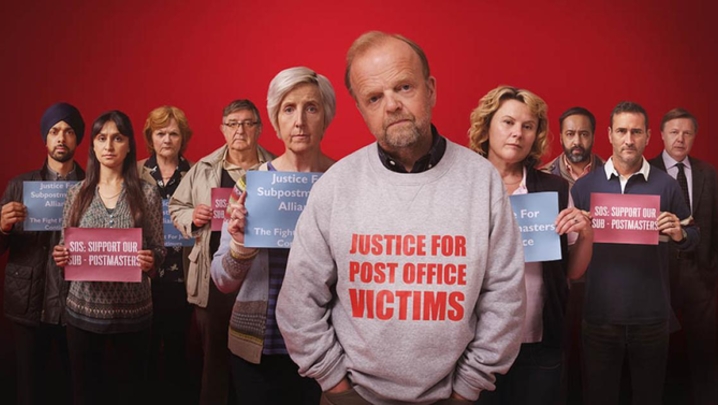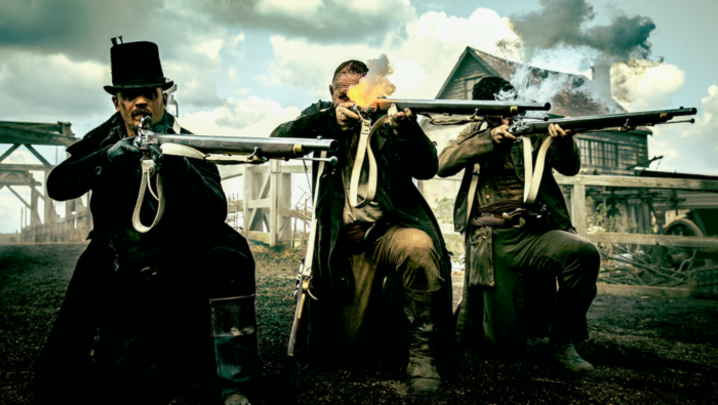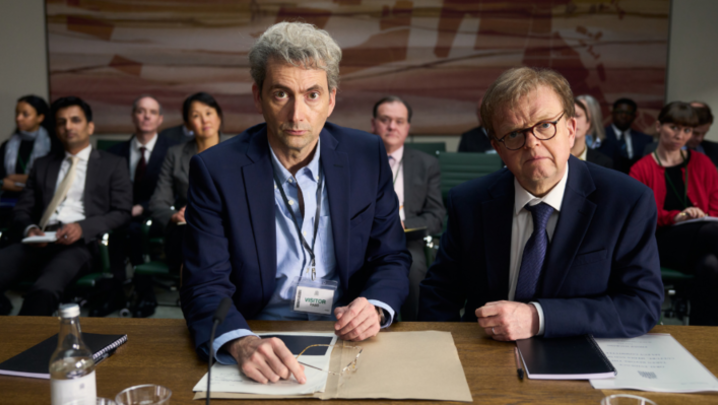On New Year’s Day 2023, a forgotten scandal became headline news.
Mr Bates vs The Post Office dramatized the unfathomable plight of hundreds of subpostmasters losing life-changing sums of money to Horizon IT.
But series director James Strong argues that part of the story’s success is that it isn’t entirely unfathomable. If you’ve ever felt your heart drop when checking your bank balance right before pay day, there’s a chance you can empathise with a woman alone in her Post Office, confronted with scarily large numbers.
“I think everyone can relate to going online, checking their balance and seeing they’re in their overdraft,” he says.
This is how Mr Bates vs The Post Office begins, with Monica Dolan as Jo Hamilton, a subpostmaster who was at the heart of her idyllic village. Trying to balance the books, she sees the outlying sum tick up before her eyes; a sum she will be required to pay. In another relatable moment, Jo calls her designated helpline. “You never get the same person twice, never get the same advice twice… you’re always on the back foot as the little person on their own, dealing with a big corporation,” remarks Strong.
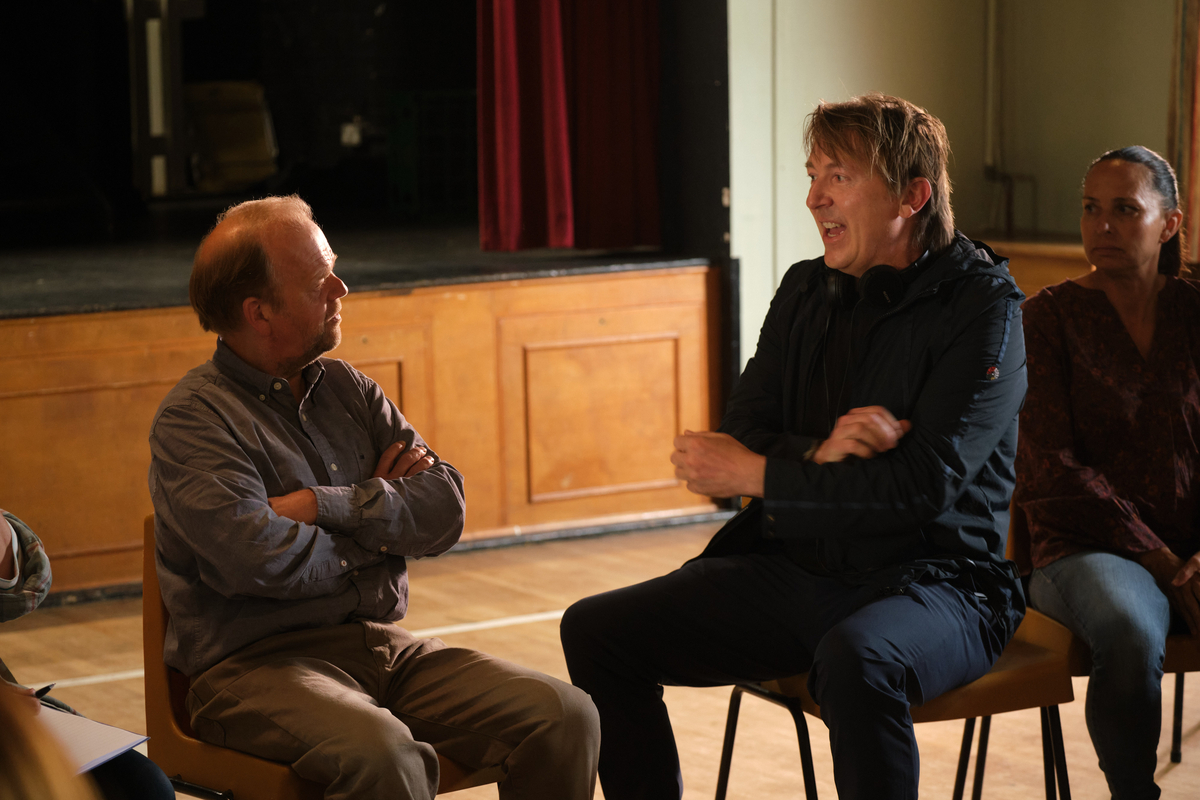
(Credit: Joss Barratt)
The big corporation Strong references here is, of course, the Post Office. Although some may have been aware of the Post Office scandal before the series’ arrival, it had passed many by. Spanning a decade and a half, over 900 subpostmasters were accused and convicted of stealing from their Post Offices. As it transpired, it was the fault of a computer bug in Horizon, the accounting software that measured their shortfalls. The system showed incorrect shortfalls amounting to thousands of pounds, thousands that would be paid by the victims. Alan Bates, an owner of a Post Office in Wales (portrayed by Toby Jones in the series) rallied 555 of the victims to take it to trial.
Strong is no stranger to transforming real world events into gripping drama, having directed series on events ranging from the Great Train Robbery of 1963 (The Great Train Robbery, 2013) to the creation of DNA fingerprinting (Code of a Killer, 2015). In Mr Bates, the series makes a point of saying “this is a true story” at the head of each episode, and it has the background research to back it up.
Screenwriter Gwyneth Hughes spent days picking through emails and meeting minutes, ensuring the dialogue of characters such as former Post Office CEO Paula Vennells was a complete reiteration of their own words. Although this was practical, as it ensured the creators of the programme wouldn’t get (in a rather meta way) taken to court, Strong argues that the truth is also more interesting than what someone might invent: “The truth is baffling, but that's human behaviour. The truth becomes a constraint, but it's not a limitation.” Within these constraints, Lia Williams, who portrayed Vennells, worked together with Strong to make it sound and feel natural, “I think it’s a credit to Lia that she did such an amazing job,” says Strong.
Being told you owe a corporation £30,000 is definitely a modern-day horror story, so Mr Bates needed its antagonist. Although Paula Vennells might be seen as the face of the opposition, she doesn’t enter the drama until later in the series, leaving Horizon, the software, as our villain. Strong explains the challenges surrounding this: “The drama takes place in regional post offices, people's houses, front rooms, bedrooms, kitchens. So, it's not immediately the most visual and exciting. The enemy, the bad guy, is a computer software bug which, again, is not the most immediately dynamic.”

Yet, when Strong describes Jo Hamilton watching the shortfalls grow, as “a woman on her own at night, in this completely isolated environment, and then a computer, with a mind of its own, ruining her life”, the horror is clear. Horizon is akin to Doctor Who’s emotion-stealing Cybermen, or M3gan’s homicidal robot-baby doll.
The omnipresence of the blinking box of wires under the Post Office desks or in corners of the room transforms “these lovely little post offices into places of horror, by this computer bug that was ruining their lives.” And there's a slight element of dramatic irony, as ‘the enemy’ is always under their noses.
Perceptive viewers might notice that in these moments there is a camera zoom to “isolate and put the pressure on characters.”
“In a show where everything else is quite naturalistic and straightforward, this was our key device, which gave us a sort of thriller dimension as well.”
The battle was partially won at the Court of Appeal in 2021. Although you might expect Alan Bates to be in the centre of the action as the series' ‘hero’, celebrating with the others in tears of happiness, the truth of the matter is that he was sat at home watching the proceedings on television with his wife Suzanne (played by Julie Hesmondhalgh). Strong describes this as one of the moments where truth is better than fiction: “On a script level, I was like ‘maybe we should have Alan there. Maybe he should be part of the finale’ but Toby Jones and Julie Hesmondhalgh, they were so good in those scenes. It’s so natural. So real.
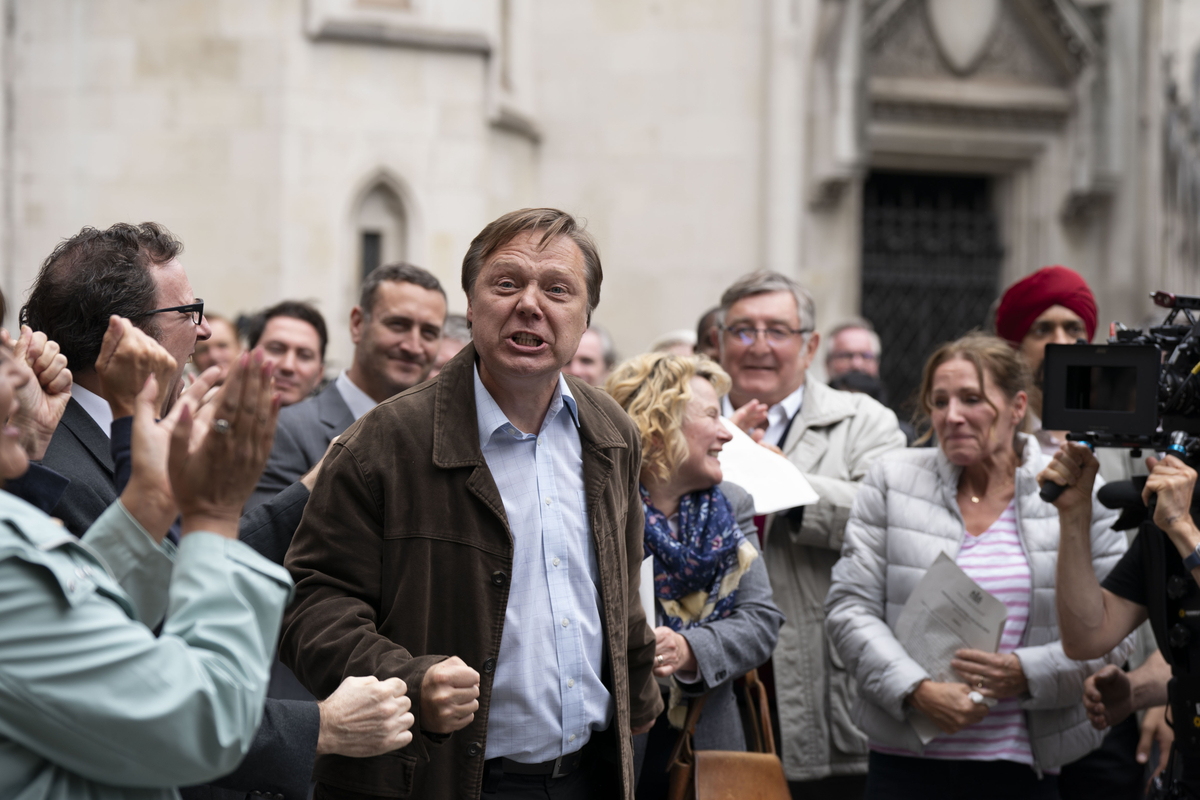
after winning at the Court of Appeal (Credit: ITV)
“They’re having the best moment of their lives and getting what they've been after for 20 years… and yet, Alan's there watching telly and it's all profoundly moving. It’s one of my favourite bits in the whole series.”
Strong wasn’t afraid of being moved whilst directing the series. Aware he was tackling a story that caused the breakdown of families, joblessness and even suicide, it felt important to make it “emotionally devastating.” “Monica Dolan was always ribbing me: ‘James, you’re crying again… he's crying!’”
He was wary, however, of making the series feel “unremittingly grim”, so the court hearing was a necessary ending to show the light at the end of the tunnel. Although there’s still a long way to go, the ITV series pushed certain aspects over the finish line, with the government (at that time under Rishi Sunak) officially stating that the victims of the Horizon scandal will have their names cleared under new laws. This took place only 10 days after the show aired, with Strong being invited to parliament to see the Prime Minister announce it himself.
“It became a phenomenon, it was just mind blowing - I don't think I'll ever be part of anything quite so big again.”
James Strong was nominated in the Director – Scripted category at the RTS Craft & Design Awards 2024.


